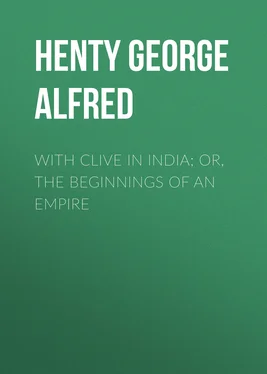George Henty - With Clive in India; Or, The Beginnings of an Empire
Здесь есть возможность читать онлайн «George Henty - With Clive in India; Or, The Beginnings of an Empire» — ознакомительный отрывок электронной книги совершенно бесплатно, а после прочтения отрывка купить полную версию. В некоторых случаях можно слушать аудио, скачать через торрент в формате fb2 и присутствует краткое содержание. Жанр: foreign_children, foreign_antique, foreign_prose, prose_military, на английском языке. Описание произведения, (предисловие) а так же отзывы посетителей доступны на портале библиотеки ЛибКат.
- Название:With Clive in India; Or, The Beginnings of an Empire
- Автор:
- Жанр:
- Год:неизвестен
- ISBN:нет данных
- Рейтинг книги:5 / 5. Голосов: 1
-
Избранное:Добавить в избранное
- Отзывы:
-
Ваша оценка:
- 100
- 1
- 2
- 3
- 4
- 5
With Clive in India; Or, The Beginnings of an Empire: краткое содержание, описание и аннотация
Предлагаем к чтению аннотацию, описание, краткое содержание или предисловие (зависит от того, что написал сам автор книги «With Clive in India; Or, The Beginnings of an Empire»). Если вы не нашли необходимую информацию о книге — напишите в комментариях, мы постараемся отыскать её.
With Clive in India; Or, The Beginnings of an Empire — читать онлайн ознакомительный отрывок
Ниже представлен текст книги, разбитый по страницам. Система сохранения места последней прочитанной страницы, позволяет с удобством читать онлайн бесплатно книгу «With Clive in India; Or, The Beginnings of an Empire», без необходимости каждый раз заново искать на чём Вы остановились. Поставьте закладку, и сможете в любой момент перейти на страницу, на которой закончили чтение.
Интервал:
Закладка:
"The French in Madras!" Charlie exclaimed in surprise. "Why, sir, there's no chance of that, is there?"
"A very great chance," the doctor said. "Don't you know that they captured the place three years ago?"
"No, sir; I'm ashamed to say that I know nothing at all about India, except that the Company have trading stations at Bombay, Madras, and Calcutta."
"I will tell you about it," the doctor said. "It is as well that you should understand the position of affairs, at the place to which you are going. You must know that the Company hold the town of Madras, and a few square miles of land around it, as tenants of the Nawab of the Carnatic, which is the name of that part of India. The French have a station at Pondicherry, eighty-six miles to the sou'west of Madras. This is a larger and more important town than Madras, and of course the greatest rivalry prevails between the English and French.
"The French are much more powerful than the English, and exercise a predominating influence throughout the Carnatic. The French governor, Monsieur Dupleix, is a man of very great ability, and far-seeing views. He has a considerable force of French soldiers at his command, and by the aid which he has given to the nawab, upon various occasions, he has obtained a predominating influence in his councils.
"When war was declared between England and France, in the year '44, the English squadron under Commodore Barnet was upon the coast, and the Company sent out orders to Mr. Morse, the governor of Madras, to use every effort to destroy the French settlement, of whose rising power they felt the greatest jealousy. Dupleix, seeing the force that could be brought against him, and having no French ships on the station, although he was aware that a fleet under Admiral La Bourdonnais was fitting out and would arrive shortly, dreaded the contest, and proposed to Mr. Morse that the Indian colonies of the two nations should remain neutral, and take no part in the struggle in which their respective countries were engaged. Mr. Morse, however, in view of the orders he had received from the Company, was unable to agree to this.
"Dupleix then applied to the nawab who, at his request, forbade his European tenants to make war on land with each other, an order which they were obliged to obey.
"In July, 1746, La Bourdonnais arrived with his fleet, and chased the small English squadron from the Indian seas. Dupleix now changed his tactics, and regardless of the injunction which he himself had obtained from the nawab, he determined to crush the English at Madras. He supplied the fleet with men and money, and ordered the admiral to sail for Madras. The fleet arrived before the town on the 14th of September; landed a portion of its troops, six hundred in number, with two guns, a short distance along the coast; and on the following day disembarked the rest, consisting of a thousand French troops, four hundred Sepoys, and three hundred African troops, and summoned Madras to surrender.
"Madras was in no position to offer any effectual resistance. The fort was weak and indefensible. The English inhabitants consisted only of a hundred civilians, and two hundred soldiers. Governor Morse endeavoured to obtain, from the nawab, the protection which he had before granted to Dupleix, a demand which the nawab at once refused.
"I was there at the time, and quite agreed with the governor that it was useless to attempt resistance to the force brought against us. The governor, therefore, surrendered on the 21st. The garrison, and all the civilians in the place not in the service of the Company, were to become prisoners of war; while those in the regular service of the Company were free to depart, engaging only not to carry arms against the French until exchanged. These were the official conditions; but La Bourdonnais, influenced by jealousy of Dupleix, and by the promise of a bribe of forty thousand pounds, made a secret condition with Mr. Morse, by which he bound himself to restore Madras in the future, upon the payment of a large sum of money. This agreement Dupleix, whose heart was set upon the total expulsion of the English, refused to ratify.
"A good many of us considered that, by this breach of the agreement, we were released from our parole not to carry arms against the French; and a dozen or so of us, in various disguises, escaped from Madras and made our way to Fort Saint David, a small English settlement twelve miles south of Pondicherry. I made the journey with a young fellow named Clive, who had come out as a writer about two years before. He was a fine young fellow; as unfitted as you are, I should think, Marryat, for the dull life of a writer, but full of energy and courage.
"At Fort Saint David we found two hundred English soldiers, and a hundred Sepoys, and a number of us, having nothing to do at our own work, volunteered to aid in the defence.
"After Dupleix had conquered Madras, the nawab awoke to the fact of the danger of allowing the French to become all-powerful, by the destruction of the English, and ordered Dupleix to restore the place. Dupleix refused, and the nawab sent his son Maphuz Khan to invest the town. Dupleix at once despatched a detachment of two hundred and thirty French, and seven hundred Sepoys, commanded by an engineer officer named Paradis, to raise the siege.
"On the 2nd of November, the garrison of Madras sallied out and drove away the cavalry of Maphuz Khan; and on the 4th, Paradis attacked his army, and totally defeated it.
"This, lads, was a memorable battle. It is the first time that European and Indian soldiers have come into contest, and it shows how immense is the superiority of Europeans. What Paradis did then opens all sorts of possibilities for the future; and it may be that either we or the French are destined to rise, from mere trading companies, to be rulers of Indian states.
"Such, I know, is the opinion of young Clive, who is a very long-headed and ambitious young fellow. I remember his saying to me one night, when we were, with difficulty, holding our own in the trenches, that if we had but a man of energy and intelligence at the head of our affairs in Southern India, we might, ere many years passed, be masters of the Carnatic. I own that it appears to me more likely that the French will be in that position, and that we shall not have a single establishment left there; but time will show.
"Having defeated Maphuz Khan, Dupleix resolved to make a great effort to expel us from Fort Saint David, our sole footing left in Southern India; and he despatched an army of nine hundred Frenchmen, six hundred Sepoys, and a hundred Africans, with six guns and mortars, against us. They were four to one against us, and we had hot work, I can tell you. Four times they tried to storm the place, and each time we drove them back; till at last they gave it up in disgust, at the end of June, having besieged us for six months.
"Soon after this Admiral Boscawen, with a great fleet and an army, arrived from England; and on 19th of August besieged Pondicherry. The besieging army was six thousand strong; of whom three thousand, seven hundred and twenty were English. But Pondicherry resisted bravely, and after two months the besiegers were forced to retire, having lost, in attacks or by fever, one thousand and sixty-five men.
"At the end of the siege, in which I had served as a medical officer, I returned to England. A few months after I left, peace was made between England and France, and by its terms Dupleix had to restore Madras to the English. I hear that fighting has been going on ever since, the English and French engaging as auxiliaries to rival native princes; and especially that there was some hot fighting round Devikota. However, we shall hear about that when we get there."
"And what do you think will be the result of it all, Doctor Rae?"
"I think that undoubtedly, sooner or later, either the French or ourselves will be driven out. Which it will be remains to be seen. If we are expelled, the effect of our defeat is likely to operate disastrously at Calcutta, if not at Bombay. The French will be regarded as a powerful people, whom it is necessary to conciliate, while we shall be treated as a nation of whom they need have no fear, and whom they can oppress accordingly.
Читать дальшеИнтервал:
Закладка:
Похожие книги на «With Clive in India; Or, The Beginnings of an Empire»
Представляем Вашему вниманию похожие книги на «With Clive in India; Or, The Beginnings of an Empire» списком для выбора. Мы отобрали схожую по названию и смыслу литературу в надежде предоставить читателям больше вариантов отыскать новые, интересные, ещё непрочитанные произведения.
Обсуждение, отзывы о книге «With Clive in India; Or, The Beginnings of an Empire» и просто собственные мнения читателей. Оставьте ваши комментарии, напишите, что Вы думаете о произведении, его смысле или главных героях. Укажите что конкретно понравилось, а что нет, и почему Вы так считаете.












